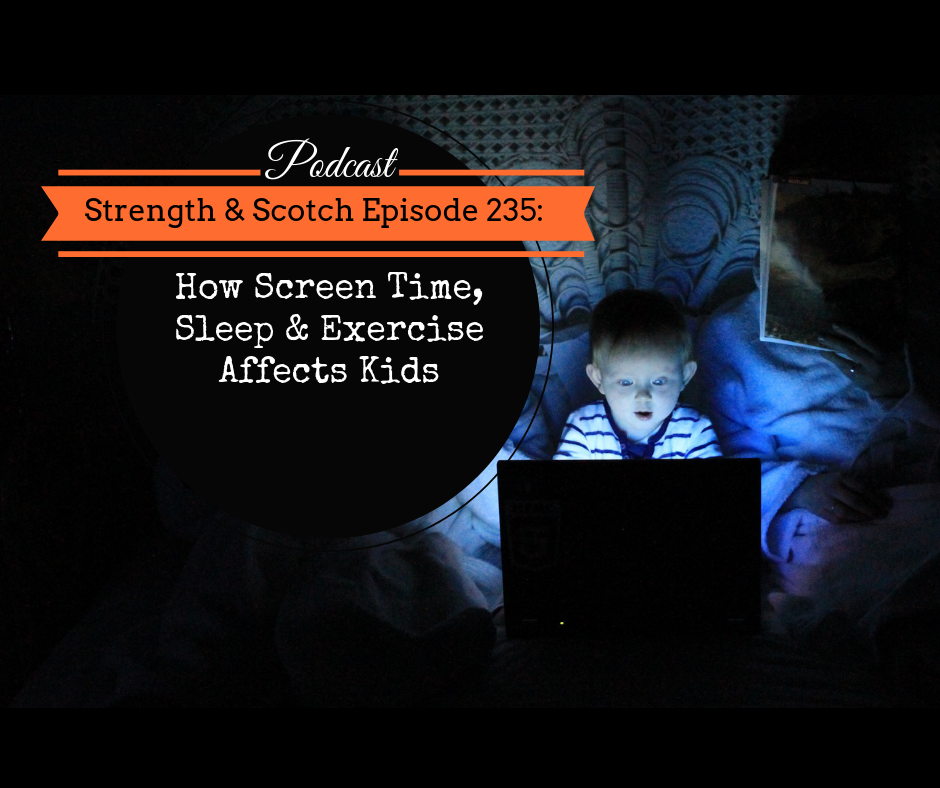Episode 235 Show Notes
Grant and Heavey tackle the effect of screen time, sleep, and physical activity on the cognitive development of kids.
Can you guess how many hours kids are spending on their screens on average per day? It may no longer come as a surprise, still it’s worth knowing! (Especially if you’re a parent so at least, you can make better and more sound decisions for your kids.) Plus, Grant names his top 5 whiskeys under $60!
[04:07] Healthy Infant Foods
Heavey found this tweet from a researcher, Stefan Guyenet, “It’s interesting to note that a lot of baby food is made from a small number of unrefined, minimally-processed ingredients with no added fats, sugars, or salt. People demand healthy food for their infants but often don’t eat it themselves.”
Heavey finds this striking. It’s not that people prioritize their children over themselves. But it’s that stark contrast of how we allow them to eat the worst food possible once they grow up. There’s probably that fear factor where the parent would rather play it safe than run the risk of their kids getting sick. Moreover, CDC reports that the incidence of obesity in school-age children is 20%.
[08:44] Child Development and Screen Time
Today, particularly, Heavey touches more on brain development and cognition. Grant believes screen time should never replace activity, interaction, and sports.
But did you know that kids in the U.S. spend an average of 7.5 hours per day engaged in screen-based activities?
Heavey thinks the evidence on screen time and cognition is mixed and this is based on the types of screen time and the kid’s age. That being said, there are other factors that affect development.
[13:10] Physical Activity Improves Cognitive Function
There’s evidence that a single bout of physical activity can benefit cognition in children in terms of reaction time, attention, memory, and academic performance. The effects are more pronounced with increasing levels of physical fitness. So the more fit you are, the smarter you are.
Brand X, the gym that developed the original CrossFit program for kids, developed a system where kids would do their training and do their homework after. This is based on the research suggesting that higher intensity activity leads to improved cognitive function.
Grant interestingly points out that it could be the structure of the physical activity that creates the attitude of the kids.
[16:00] Sleep and Cognitive Function
Sleep quantity and quality are both associated with cognition and academic performance in kids. Heavey mentions this meta-analysis of kids aged 6-13 showed increased sleep duration was connected directly to superior verbal skills and higher IQ.
Based on this research, there’s actually this whole movement of changing the start time for school. Grant seconds the motion, saying he can’t be as sharp when he had to wake up early.
[17:22] Are Your Kids Meeting Their Recommended Sleep, Screen Time, and Physical Activity per Day?
Heavey found this research called, Associations Between 24-Hour Movement Behaviors and Global Cognition in U.S. Children: A Cross-Sectional Observational Study.
In the study, they examined the impact of recommendations of the Canadian government which includes 60 minutes of physical activity per day, 2 hours or less of recreational screen time, and 9-11 hours of sleep per night for children aged 8-11.
Data was based on a 10-year longitudinal study across 21 different sites in the U.S. The primary outcome assessed was global cognition. This included an assessment of language abilities, episodic memory, executive function, attention, working memory, and processing speed.
Out of the 4,000 kids they observed, they found that 51% met the sleep recommendation. Only 37% met the screen time recommendation. While only 18% met the physical activity recommendations.
Based on this, kids must be just spending most of their time on the screen. The generation now is just inundated with screen time and we really don’t know what’s the future for your kids.
Moreover, 71% of all the kids just met at least one of the recommendations. While 5% of kids met all three. The crazy thing about this is that this study is subject to a major limitation. The data are self-reported and people are horrible at reporting accurate numbers.
[24:00] Screen Time Offsets Benefits of Sleep
Based on the same study above, they found that meeting more than one recommendation was more strongly associated with academic achievement than meeting one or none. Meeting all three was better for a child’s overall physical and psycho-social health than meeting just one.
Interestingly, they found an inhibitory effect with the screen time. The kids that met the sleep requirement but did not meet the screen time requirement performed as if they didn’t meet the sleep requirement. So the screen time can cancel out the effect of getting good sleep. This may have to do with factors like the whole blue light thing.
Heavey would recommend really minimizing screen time for kids as there are some risks associated with higher levels of screen time.
[26:15] The Top 5 Scotches Under $60
Grant explains that there is so much that goes into what the “best” is. First on the list is Arran, an isle whiskey at $49. Second is from Islay, which is the Bowmore 12 at $45. The third bottle is the Laphroaig 10 (still from Islay) at $46. Another brand that’s worth mentioning is the Glenfarclas 12 at $49. Last on the list is Johnnie Walker Black Label.
Links

Check out the gear page for everything Strength & Scotch! You’ll find a listing of all the supplements and other programs we’ve discussed on the show as well as our killer t-shirts!

